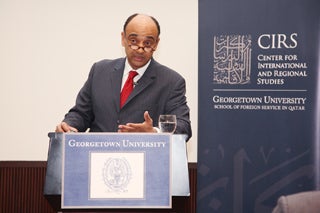Professor Kwame Anthony Appiah Delivers Lecture on Cosmopolitanism

Members of the Georgetown University School of Foreign Service in Qatar (SFS-Q) community and guests were invited to a Monthly Dialogue Series event conducted by visiting Center for International and Regional Studies (CIRS) scholar and Princeton Professor Kwame Anthony Appiah, entitled, “Being a Citizen of the World Today.” CIRS and SFS-Q hosted the event, which was well attended by students, faculty members, staff and members of the wider community in Qatar.
Appiah began by stating that he would draw upon the past, specifically intellectual history. He continued with a brief introduction on the idea of cosmopolitanism for his audience, starting with the Greeks, specifically Diogenes the Cynic. He traced the evolution of cosmopolitanism through to the European Enlightenment and the contemporary impetus towards globalization.
Cosmopolitanism, as described by Appiah, has three central tenets – first, that all human beings are fellow citizens, second, that the duty of care applies to all human beings and third, that conversations should be held across differences. In particular, Appiah argued that the best way to understand the idea of global citizenship does not involve the development of a single world government. He differentiates his account from other universalisms because it recognizes the plurality and celebrates the diversity of human experiences.
Appiah also noted the importance that technological advances have had in strengthening cosmopolitanism as a worldview, including the printing press, and even Al Jazeera and other global media channels.
When asked about the contribution that Muslims have historically made to cosmopolitanism, he was emphatically in agreement. “The first model of cosmopolitan cohabitation in Europe was in Muslim Andalus,” he answered. He went on to explain that the ideas of the Cynics would not have been disseminated throughout Europe without the contributions of Muslim scholars in Andalus and elsewhere who developed and transmitted these ancient philosophical traditions.
With regard to current instances of cosmopolitanism, Appiah considers cities such as Doha and Dubai to be interesting examples of places in which cosmopolitans should feel at home, not simply for amusement, including tourism, sports and events, but in the context of shared projects. He qualified these successes by saying, “There does exist a cosmopolitanism at the bottom and a cosmopolitanism at the top. Someone living in a refugee camp, for example, can be very open to the world. Whereas someone who is within the upper income bracket of his or her society can also be very uncosmopolitan.”
Professor Kwame Anthony Appiah is in Qatar as a visiting scholar with Georgetown SFS-Q’s Center for International and Regional Studies (CIRS). CIRS is a premier research institute devoted to the academic study of regional and international issues. CIRS sponsors a number of forums throughout the year facilitating dialogue and an exchange of ideas on a broad range of issues with the aim of engaging and enriching the university students and community.
Founded in 1789, Georgetown University is the oldest Catholic and Jesuit University in the United States. Today, it is a major student-centered, international, research university offering respected undergraduate, graduate and professional programs in Washington, DC, Doha and internationally. The establishment of the Qatar campus in 2005 continues a long history of engagement in the Middle East.
Meanwhile, since 1919, the Edmund A. Walsh School of Foreign Service at Georgetown University has devoted itself to educating the next generation of diplomats, global leaders and scholars. At the Doha campus, students have the opportunity to major in International Economics (IECO), International Politics (IPOL) or Culture and Politics (CULP).